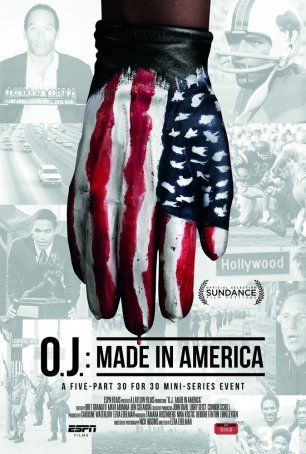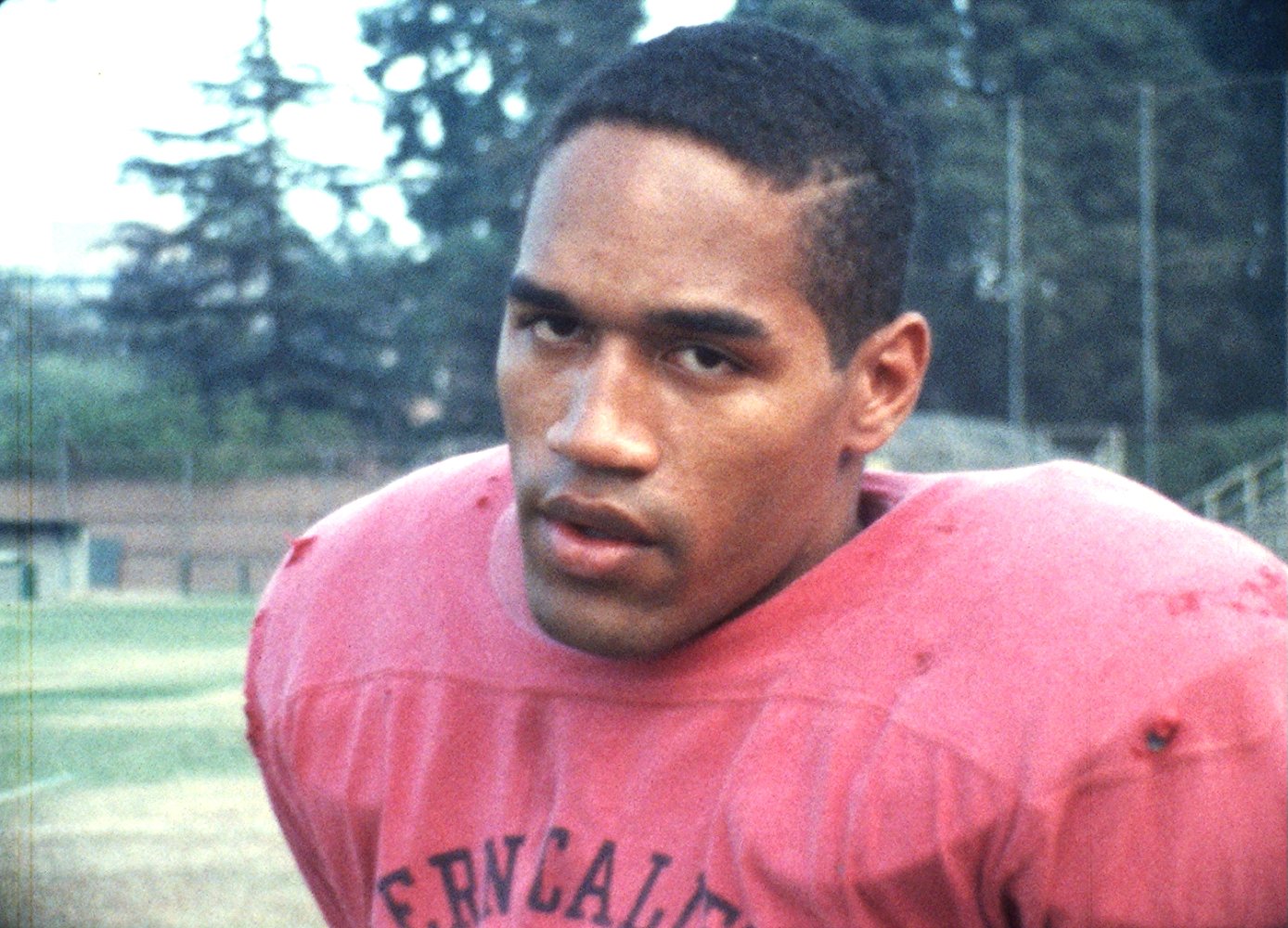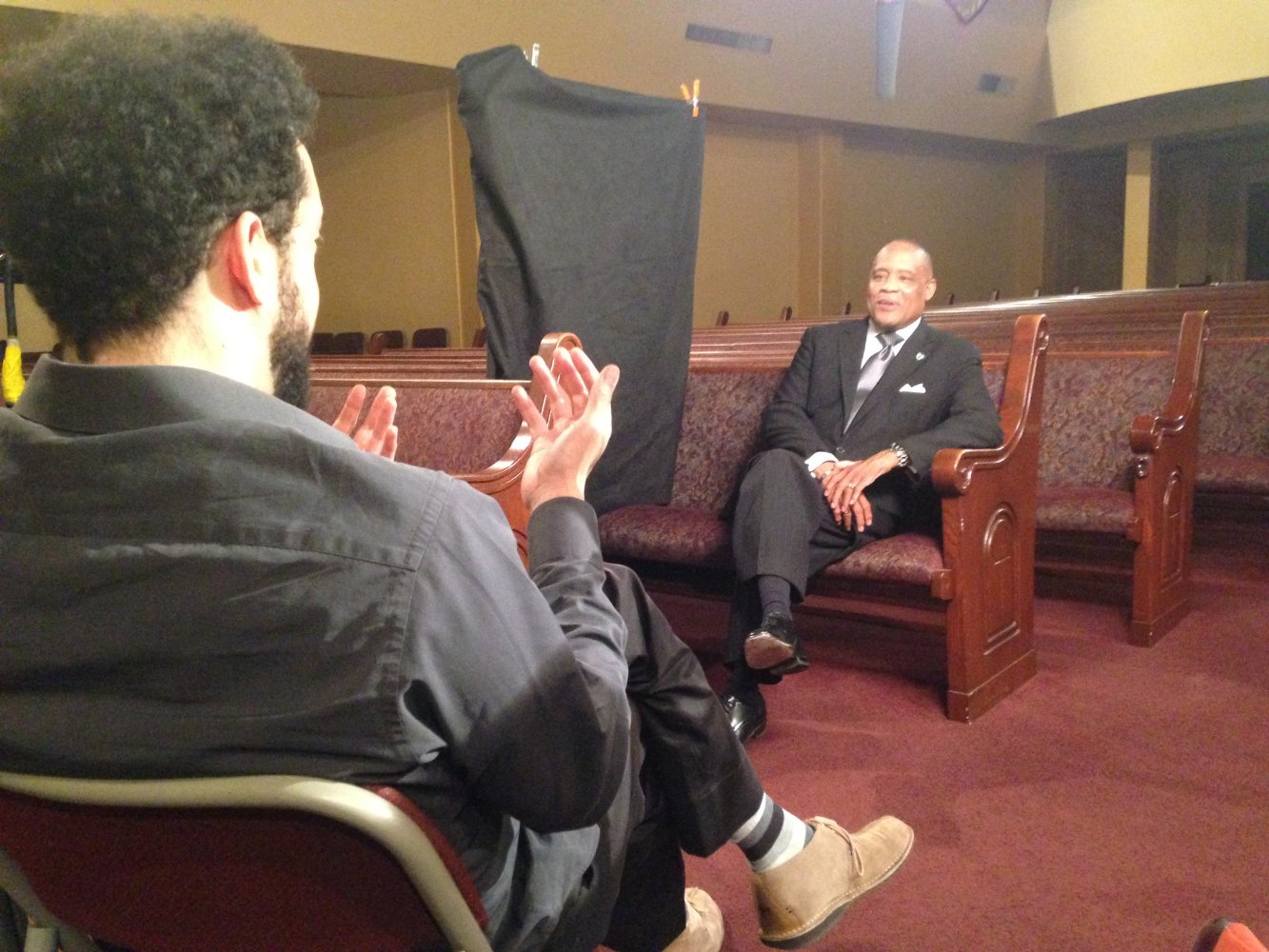O.J.: Made in America (United States, 2016)
August 28, 2017
O.J.: Made in America, an epic documentary from Ezra Edelman, explores not only the rise and fall of one of football’s iconic players, but the status of race relations in America and the impact of celebrity-worship on modern culture. Although the eight-hour running length (officially, 7:47) is a barrier to single-sitting watching, it gives Edelman the latitude to provide not only breadth but depth. The unhurried approach allows him not only to provide a thorough biography of the title character but a look at all the factors that led to his trial. For the first time, a documentary clearly and concisely explains why, even though he was most likely guilty, O.J. was unanimously acquitted by a jury of his peers.
The movie begins with an extended look at the aspects of O.J.’s life that brought him to national attention. As a junior at USC in 1967, he was the standout star in the grudge match against rival UCLA in what is considered by some experts to be among the greatest college football games ever. The following year, he won the Heisman Trophy before being drafted as the consensus #1 pick by the Buffalo Bills. Although Simpson’s first three professional seasons were disappointments, he turned things around in 1972 and in 1973 had a monster season, breaking the 2000-yard rushing mark and winning the MVP award. The remainder of his NFL career, which ended in 1979, was productive but didn’t contain any other remarkable moments. However, long before he stopped playing football, he had begun to branch out into another field tailor-made for someone possessing his charisma: acting.
I don’t really remember O.J. the football player, but I remember O.J. the actor and O.J. the Hertz pitch-man. As he transitioned away from football, he sought to enhance his public image. To that end, he distanced himself from “black America” and embraced “white culture.” This extended to his social circle and, eventually, his second wife, Nicole Brown. O.J.: Made in America details their tumultuous marriage, which was marred by recurring spousal abuse and numerous calls to the police. Of all the evidence arguing for O.J.’s guilt in Nicole’s murder, this is the most compelling – tapes of the 911 calls are especially chilling as they present a vastly different O.J. from the smiling man who doled out TV appearances like candy.
 In addition to detailing O.J.’s years prior to the murder,
the film takes its time providing context. This proves to be a key element –
one often missing from other chronicles of the crime/trial. Unrestrained by
time concerns, Edelman is able to explore the fractious relationship between
the LAPD and the black community – a relationship that became a tinderbox with
the March 1991 beating of Rodney King and exploded when the officers involved
were acquitted in April 1992.
In addition to detailing O.J.’s years prior to the murder,
the film takes its time providing context. This proves to be a key element –
one often missing from other chronicles of the crime/trial. Unrestrained by
time concerns, Edelman is able to explore the fractious relationship between
the LAPD and the black community – a relationship that became a tinderbox with
the March 1991 beating of Rodney King and exploded when the officers involved
were acquitted in April 1992.
On June 12, 1994, Nicole Brown Simpson and Ron Goldman were stabbed to death outside Nicole’s house. O.J. was immediately identified as a person of interest and, following the infamous “slow speed chase”, he was taken into custody. Media interest was at a fever pitch. Arguably, the chase, arrest, and trial represented the last great pre-Internet news event – although businesses were gradually plugging into the World Wide Web at the time, its usage was spotty and limited for home use. O.J.: Made in America gives a sense of the mood at the time and provides sufficient coverage of the “Trial of the Century” (which lasted from Jan 25, 1995 until Oct 2, 1995) for contemporary viewers to understand the myriad issues raised during the course of the eight-month ordeal.
O.J.’s acquittal was largely unexpected and sent a seismic shock through the United States. The widespread belief, especially in the non-African American strata of society, was that the man had literally gotten away with murder, having used his celebrity and wealth to buy the “not guilty” verdict. As presented in O.J.: Made in America, the evidence argues strongly in favor of O.J.’s guilt. This is not, however, a “true crime” movie attempting to provide a definitive answer. (In interviews, Edelman has said he believes O.J. did it.) Instead, in its examination of the cultural impact, it provides the “missing piece” that so many people pondering the verdict missed. For most of America, O.J. Simpson was on trial. But for the 12 men & women who counted, it wasn’t O.J.; it was the LAPD. Edelman interviews one of the jurors and she confirms that, when they deliberated, much of the discussion was about Rodney King. O.J. had become the tool by which the LAPD’s methods were repudiated.
O.J.: Made in America concludes with a coda. Post-trial, O.J. became an odd, ironic Civil Rights figure – a “wrongly accused” man who was victimized by a racist police force. Despite attempts, he was never again able to achieve the kind of widespread acceptance he had once enjoyed, especially in the white community. He was found culpable for Nicole and Ron Goldman’s death in a civil trial and, a dozen years later, he was convicted of armed robbery and kidnapping – acts for which he spent nine years behind bars. Many feel that the robbery conviction was a proxy for the failed murder counts, much like Al Capone’s tax evasion charges.
O.J.: Made in America has a huge canvas to cover and it does so expertly, laying out the former superstar’s history in all its greatness and ugliness. With so much of O.J.’s story having played out in the media, there’s no shortage of clips and Edelman mines them to good effect. Although “Juice” never spoke to Edelman (not answering a letter the director sent to him), his presence looms large throughout the film as does that of his murdered wife. There are new interviews with Mark Furhman (in which he attempts to explain his attitudes and actions), F. Lee Bailey, Marcia Clark, Fred Goldman, and Peter Hyams (who directed O.J. in Capricorn One and subsequently became a friend). Others, like former O.J. lawyer Robert Shapiro, are presented through archived interviews. Edelman has no shortage of “talking heads” but almost everything they have to say is interesting and it is interspersed in between the lengthy news footage that forms the backbone of the narrative.
 The story of O.J. Simpson is an American tragedy. It’s left
to the viewer to determine whether the sports icon O.J. was at any time genuine
or whether the image was always a mask. Were the violent demons that caused him
to beat Nicole during their marriage always there, lurking, or did they emerge
after he left football behind? Clearly, O.J. was ambitious and had little
interest in being associated with “black causes” or Civil Rights activism until
it suited his needs. However, as imperfect as he may have been to spearhead a
cause, he was nevertheless embraced by those who wanted to take down the LAPD
for their racist tactics and “stick it to” a legal system that had acquitted
those who beat Rodney King. The connection between those two men, although not
immediately evident, becomes clear during the course of the film. Nicole Brown
Simpson and Ron Goldman were victimized twice – once on Nicole’s doorstep in
1994 and once in a courtroom in 1995.
The story of O.J. Simpson is an American tragedy. It’s left
to the viewer to determine whether the sports icon O.J. was at any time genuine
or whether the image was always a mask. Were the violent demons that caused him
to beat Nicole during their marriage always there, lurking, or did they emerge
after he left football behind? Clearly, O.J. was ambitious and had little
interest in being associated with “black causes” or Civil Rights activism until
it suited his needs. However, as imperfect as he may have been to spearhead a
cause, he was nevertheless embraced by those who wanted to take down the LAPD
for their racist tactics and “stick it to” a legal system that had acquitted
those who beat Rodney King. The connection between those two men, although not
immediately evident, becomes clear during the course of the film. Nicole Brown
Simpson and Ron Goldman were victimized twice – once on Nicole’s doorstep in
1994 and once in a courtroom in 1995.
O.J.: Made in America is an extraordinary achievement in that not only does it provide a definitive overview of O.J.’s life – warts and all – but it offers new insights into events that have been picked over repeatedly over the past 20+ years. The film’s length is mitigated by its being broken into five parts, allowing it to be more easily digested than would be the case with a single, unbroken viewing. It won a slew of major awards, including the Oscar and Critics’ Choice citation, and was named on countless Top 10 lists. The ease with which it can be viewed (it’s an ESPN on-demand program – without commercials) makes a compelling case that this is something that shouldn’t be missed. And, with the tightening focus on race-related cultural schisms and issues, the subject matter, despite having been litigated in the mid-1990s, is as relevant today as when it dominated the headlines. O.J.: Made in America is far more than the story of one man; it is, in many ways, the story of modern-day America.
O.J.: Made in America (United States, 2016)
Cast: O.J. Simpson, Mark Furhman, F. Lee Bailey, Marcia Clark, Fred Goldman, Peter Hyams, Nicole Brown Simpson, Johnnie Cochran, Robert Shapiro
Home Release Date: 2017-08-28
Screenplay: Ezra Edelman
Cinematography: Nick Higgins
Music: Gary Lionelli
U.S. Distributor: ESPN Films
U.S. Release Date: 2016-08-04
MPAA Rating: "NR" (Profanity, DIsturbing Images)
Genre: Documentary
Subtitles: none
Theatrical Aspect Ratio: 1.78:1
- (There are no more better movies of O.J. Simpson)
- (There are no more worst movies of O.J. Simpson)
- (There are no more better movies of Mark Furhman)
- (There are no more worst movies of Mark Furhman)
- (There are no more better movies of F. Lee Bailey)
- (There are no more worst movies of F. Lee Bailey)
Comments